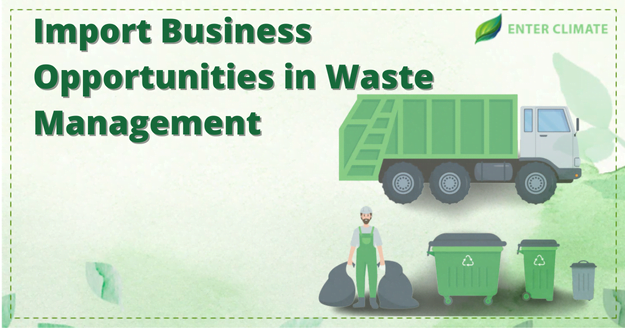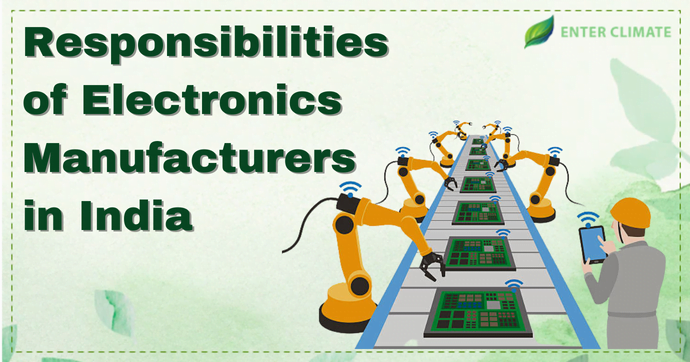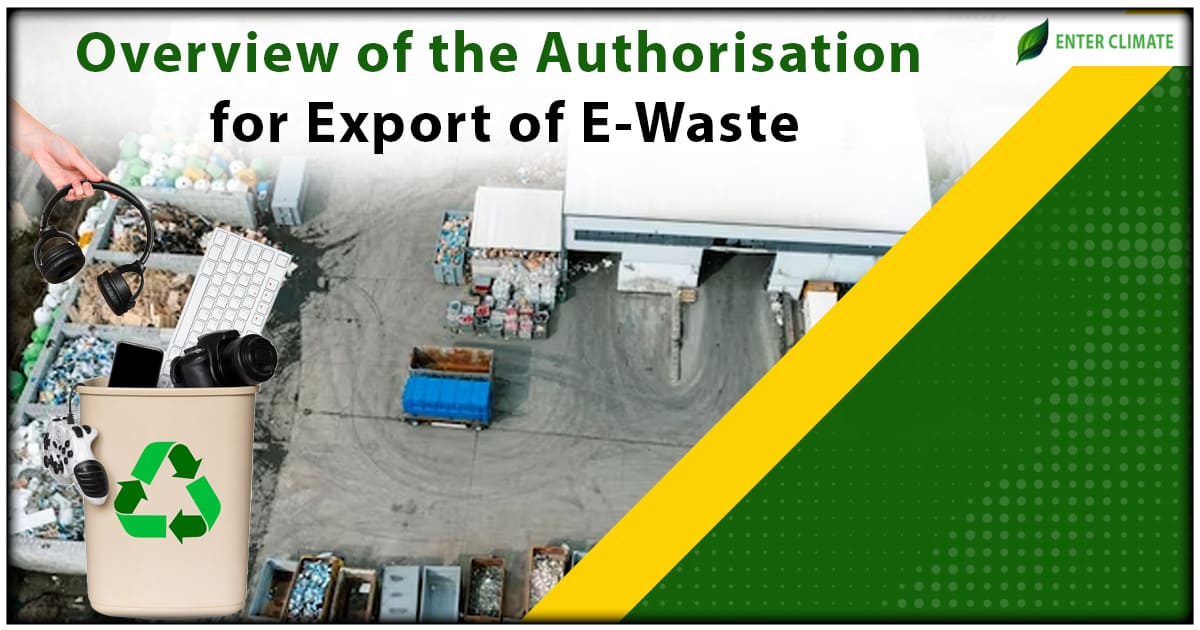Overview of Import Business opportunities in waste management
 05 Sep, 2022
05 Sep, 2022 
Waste is cheap, but waste recycling is not. A discarded item, often termed waste, may be of no use for the one who discards it, but it can have value for another. Waste trade depends on many factors other than the willingness of the country. Countries rich in specific resources like precious metals (lithium, platinum, gold, and silver), crude oil, or even the technologies for their production do have the luxury to use them in manufacturing and keep the prices low as well for the masses. But recycling and reusing such waste products containing valuable resources can provide these resources to such countries that have limited or no reserves, thereby cutting the dependence on imports. Thiscreatesimport business opportunities in waste management for locally situated small and medium-scale waste management businesses. On the other hand, many countries find it convenient to get that waste recycled outside their territory due to stringent domestic regulations, taxes or simply because the cost is too high. Countries such as India and China have developed the capacity to dispose off waste cost-effectively and have created a robust network of waste management for waste in the process. Import done to recycle and reuse is permitted in India, but illegal dumping and disposal in the country are prohibited. India’s waste management capacity has been gradually augmented manifold after the introduction of waste-related legislation in the last decade that tried and succeeded in many ways in streamlining the import-related waste management sector. India even has domestic advantages that have helped grow specific waste import businesses, like the large and willing workforce, accessible international trade routes and vast road and rail network.
Import Business opportunities in waste management- Examples
While many developing countries perform waste management for developed countries, the critical concern for them is the unscientific and unregulated trade of this waste. When regulated, managing waste like old electronics and other non-hazardous waste benefits the economy too. Waste electrical and electronic equipment (WEEE) products or used-up end-of-life products contain valuable metals like gold, silver etc., that can be extracted profitably. Let’s see the import business opportunities in waste management in the legally permissible waste trade.
Import Business opportunities in waste management through Plastic Waste Import
Overview: The government banned the import of plastic waste in 2019. But In 2021, the government has partially lifted the ban to allow restricted items to be importedThisinclude
- Import of PVC Floorings Scrap (scrap means industrial trimmings and rejects only)
- Restricted import of cellulose plastic waste such as cellulose nitrates film scrap which is non-plasticised as well as plasticised is a restricted item
- Free import of epoxide resins (including waste and scrap)
- Restricted import of Cellulose plastic waste such as cellulose acetate film scrap which can be non-plasticised as well as plasticised
Import Procedure for Plastic Waste: For the import of plastic waste, the importer will need to apply for EPR Authorisation from the CPCB and then obtain permission to import the waste (either in restricted or free category) from DGFT. At this stage, the importer will have to show the purpose for import, the capacity to recycle the waste and maintain a record of the plastic waste handled. Imports are allowed to actual users. The concerned Pollution Control Boards/Pollution Control Committees monitor the use of PVC scrap imported.
- Documents Required
- Permission from DGFT
- IEC certificate
- GST Registration
- EPR Authorisation
- Any other document required by DGFT
Import business opportunities in waste management through Scrap Metal Import
Overview: Many valuable metals like steel, copper, aluminium, nickel, tin, aluminium, zinc etc., discarded as waste, can also be imported into the country for refining and recycling. In India, the import of metal scrap waste has gained momentum after the favourable changes brought by the government to promote such imports. The government, through these schemes, is focused on building recycling and refining capacity, reducing the pressure of mining for new ores, and reducing pollution caused by mining.
Documents Needed
- IEC Registration certificate
- GST Registration
- Identity Proof
- Copy of Address Proof
- Details of the waste imported to India
- Copy of purchase order/invoice
- Details of actual use
- EPR Authorisation
- NotarisedMOU for selling imported scraps to actual user
- Partnership Deed/ AOA (if applicable)
Import business opportunities in waste management through the import of battery Waste
Lead Acid Batteries (LAB) and Lithium-ion (Li-on) batteries used in EEE devices and electric vehicles can be imported as per the Battery waste management Rules[1], 2022. Refurbishing and recycling of batteries are permitted, but import for disposal is not allowed. The waste management business around Li-on batteries is also gaining popularity with the vast availability of these batteries in the country and due to limited lithium reserves. Similarly, lead-acid batteries primarily used in automobiles and also need refining of lead to give secondary lead is also a popular business in this regard as refurbishing of such batteries is also possible.
Documents required for battery import licence
- Printouts of Form II and Form III (undertaking)
- PAN Card
- Self-attested copy of IEC Certificate
- BIS certification for battery
- Half Yearly Returns (for renewal)
Import business opportunities in waste management through Hazardous waste import
Overview: Hazardous waste import in India is banned for disposal purposes, but it is allowed for recycling and reuse. Any importer who wishes to import hazardous waste for recycling and reuse will have to apply for authorisation from the appropriate authority (MoEF/SPCB). The list of hazardous waste that can be imported with prior informed consent. Every importer of hazardous waste in India has to comply with the Basel Convention for transboundary movement of hazardous waste and shipping requirements listed in the Hazardous Waste Management Rules, 2016. The import of e-waste for refurbishing, reuse and recycling is also done under the provisions of Hazardous Waste Management Rules. Importing hazardous waste material to India without permission or importing non-usable e-waste for dumping in the country is treated as illegal.
Process of Import
The Ministry of Environment & Forest will be issuing a licence to the importer to import hazardous waste as per the Hazardous Waste Management Rules prior to import. Such waste may be imported only after inspection by customs authorities and their approval and subject to relevant permit documents. Therefore import business opportunities in waste management in hazardous waste can be used with proper guidance and assistance from professionals with relevant experience.
Documents Needed for Import License
The following documents are required for a license to import hazardous waste.
- Import Code issued by the Directorate General of Foreign Trade.
- Certificate of GST
- Identity Proof
- Copy of Address Proof
- Details of the waste to be imported to India
- Copy of purchase order/invoice
- Details of actual user
- Notarised MOU for selling imported scraps to actual user
- Partnership Deed/ AOA (if applicable)
Additional Legalities in Import Waste Management Businesses
For exploring import business opportunities in waste management, the importer needs to follow their country’s waste management laws related to handling and tans-boundary movement rules or any similar authority that regulates imports and reuse/recycling/refurbishing laws in the country. Any importer who wants to import any of the above-illustrated waste must follow the terms and conditions related to the applicable waste management, handling and Trans boundary movement rules before the actual import. Certain additional compliances must also be kept in mind while importing waste for recycling like
- Anti-dumping duty
- Permission from the Environment department
- Test report of analysis from Laboratory to import Plastic and plastic articles.
- License from Foreign Trade Office for import
- Government registration as an importer
Market Overview of Import Business in waste management
- Import business opportunities in waste management are many, and the government to has taken certain steps in this regard. For instance, to boost the recycling of copper in India, the government, in the 2021 Union budget, announced a reduction of import duty on copper scrap from 5% to 2.5%
- The DGFT has amended the import policy for ash containing precious metals and compounds including platinum, gold, and silver to “restricted” from “free”. This means a license would now be required for their inbound shipments.
- By a rough estimate, around 9 lakh tonnes of PET are manufactured in the country, of which more than 90% get recycled. India’s plastic waste processing industry is also expected to grow at a rate of 6.5%, amounting to a market size of US $53.72 billion by the end of 2023.
- While India is reducing the import of ferrous scrap and aiming to become a more self-sufficient steelmaker, imports of other metals like copper and aluminium have increased in recent times, meaning that there is a substantial import business opportunity in waste management around metal scrap imports too.
Conclusion
Dealing in waste management internationally does not necessarily mean becoming the global dump yard. Extracting the maximum value from waste is a skill in itself. A robust and regulated waste management framework can recycle the waste domestically and through imports. The reasons can be many. But the crux is whoever can extract this value profitably by exploring import business opportunities in waste management will be in demand. Recycling and reuse should not be seen as managing the waste of others but as a business opportunity. India has a high unemployment rate, and a significant ratio of the willing workforce lacks technical expertise and therefore remains unemployed. This is one of the key reasons why the informal waste management sector has flourished. The regulated import of non-hazardous waste by small businesses and traders allows them to grow and establish themselves as major players in a segment that has not been overshadowed by big corporates.
Read our Article:Extended Producer Responsibility for E-Waste Management












